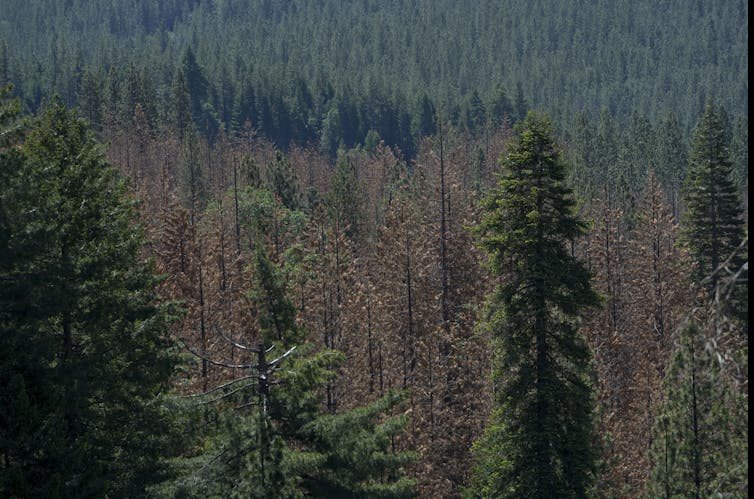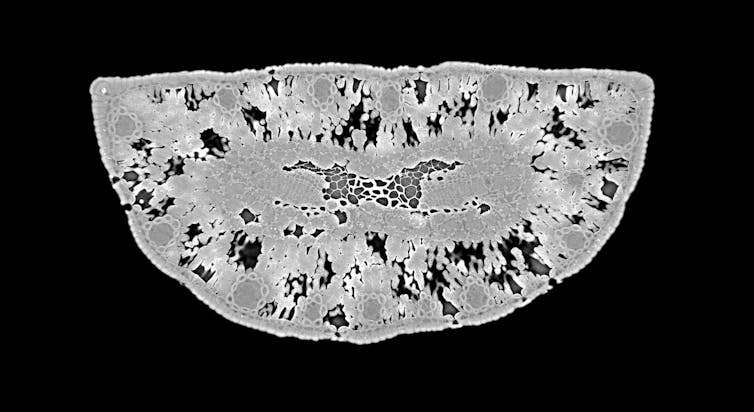News
Trees ‘remember’ wetter times − never having known abundant rain could buffer today’s young forests against climate change
In a changing climate, trees exhibit “legacy effects” from past droughts or wet periods. Young trees, adapted to arid conditions, offer hope for future forest resilience amidst escalating climate challenges globally.

Alana Chin, Cal Poly Humboldt ; Janneke Hille Ris Lambers, Swiss Federal Institute of Technology Zurich, and Marcus Schaub, Swiss Federal Institute for Forest, Snow and Landscape Research (WSL)
What does the future hold for forests in a warmer, drier world? Over the past 25 years, trees have been dying due to effects of climate change around the world. In Africa, Asia, North America, South America and Europe, drought stress amplified by heat is killing trees that have survived for centuries.
Old trees may have grown through entire millennia that were wetter than the past 20 years. We are scientists who study forest dynamics, plant ecology and plant physiology. In a recent study, we found that trees can remember times when water was plentiful and that this memory continues to shape their growth for many years after wet phases end.
This research makes us optimistic that young trees of today, which have never known 20th-century rainfall, have not shaped their structure around water abundance and thus may be better equipped to survive in a chronically dry world.

What if we water the forest?
This study built on nearly 20 years of forest research in response to early warning signs of forest loss in the 1990s in the dry Rhône River Valley of the Swiss Alps. At that time, scientists observed that Scots pine trees that had stood for around 100 years were declining and dying. They wondered whether drought or other climate factors were driving this loss.
To tackle this question, researchers at the Swiss Federal Institute for Forest, Snow and Landscape Research designed an ecological experiment. To understand the impacts of drought, they would irrigate a mature forest, doubling natural summertime rainfall, and then compare how these water-rich trees fared in comparison with those receiving only natural precipitation.
The Pfynwald experiment, launched in 2003, has shown that trees survived at higher rates in irrigated plots. After 17 years of irrigation, the team found that irrigation didn’t just help trees survive dry phases – it also increased their growth rates. https://www.youtube.com/embed/OA7A-xWhDeo?wmode=transparent&start=0 Tree physiologist Leonie Schönbeck conducts research at Pfynwald, a natural reserve in southern Switzerland, to learn how trees take up and store energy and use their reserves to recover from drought.
Legacy effects are forests’ memories
Trees experiencing drought alter their leaves, wood and roots in ways that prime them for continued dry conditions. Wood under drought might have smaller cells that are less vulnerable to future damage, and roots might increase relative to leaf area. These structural changes persist after the drought has passed and continue to influence the tree’s growth and ability to tolerate stress for many years.
Known as “legacy effects,” these lingering post-drought impacts represent an ecological memory of past climatic conditions at the tree and forest level. Knowing that trees hold a persistent memory of past dry phases, researchers wondered whether they might also show structural changes in response to past wet periods.
Eleven years after summertime irrigation started in Pfynwald, scientists stopped irrigating half of each plot in 2013 to address this question. The formerly irrigated trees, which at this point were about 120 years old, had experienced a lasting period of irrigation – but now those times of plenty were over.
Would the trees remember? A decade later, we found out.
Trees, trains and particle accelerators
On an early March morning in 2023, two of us (Alana Chin and Marcus Schaub) met at Pfynwald to collect very fresh leaf and twig samples so that we and colleagues could look inside to search for signs of lasting effects of past water richness.
At the site, we climbed canopy access towers to collect newly grown treetop leaves and twigs from control trees that had never been irrigated; trees that had been irrigated every summer since 2003; and formerly irrigated trees that had not received irrigation water since 2013.
We took our samples to the Swiss Light Source, an intensely powerful synchrotron – a type of particle accelerator that produces the world’s most intense beams of light. This facility is the home of the TOMCAT, an extremely high-resolution X-ray that allowed us to look inside our leaves and twigs without disturbing their structure.
Scanning our samples took all night, but when we stumbled out of the building, we had images capturing every cell in exquisite detail.
The memory of water
We found that the new leaves of once-irrigated trees were different from both continually watered trees and never-watered control trees. Leaves carry out photosynthesis that fuels a tree’s survival and growth. Inside them, we could see the legacy of past water abundance, written in the size, shape and arrangement of cells.
Reading this cellular signature, we observed that, at the expense of structures promoting productivity, formerly irrigated trees showed every sign of chronic water stress – even more so than never-irrigated trees. In their anatomy, we saw why these trees that had it easy for 11 wet years were now growing slowly.
Every cell in a leaf comes with a trade-off. Trees must balance investments in rapid photosynthesis with others that promote leaf survival. Rather than building the cells used to harvest sunlight and ship sugar to the rest of the tree, leaves on the trees that had been irrigated showed every indication of drought stress we could think to measure.
After receiving extra water for an 11-year stretch and then losing it, the trees were producing new, tiny leaves that invested mostly in their own survival. The leaves were structured to protect themselves from insects and drought and to store water reserves. Compared with leaves on trees that had never known irrigation, these looked as though they were in the middle of the drought of the century.
While this memory of water might seem negative, it likely once helped trees “learn” from past conditions to survive in variable environments. The formerly irrigated trees did not know that humans had played a trick on them. Like trees experiencing climate change, they had no way of knowing that the water was not coming back.

When trees experience a drought event, recovery can mean reaching a “new normal” state, in which they are prepared to survive the next drought, with smaller, less vulnerable cells and increased energy reserves to ‘save up’ for future dry periods. They may have deeper roots or a smaller pool of leaves to support, helping them prepare for an unstable environment.
We wanted to know whether the same was true of trees that had experienced water abundance. Were they waiting in distress for the water to return?
Hard times may make tough trees
In some temperate forests, like the ones we studied in Switzerland, old trees once knew levels of water abundance that now are gone, thanks to climate change. That past abundance may have locked into place structural and epigenetic changes in the trees that are mismatched to today’s drier world. If this is true, then some of today’s devastating global tree mortality events may be, in part, due to the legacy effects of past water abundance.
In most of the world’s temperate forests, however, the current cohort of young forest trees – those sprouting in the past 15 to 20 years – has managed to establish itself under conditions that once would have been considered chronic drought. Those young trees, which have survived an endless dry period, will form the forests of the future.
In all, our observations in Pfynwald have provided us some room for hope that young trees currently taking their place in many forests worldwide may be better prepared to cope with the world as humans have shaped it. Climate shifts in recent decades have primed them for hard times, without the lingering memory of water.
Alana Chin, Assistant Professor of Plant Physiology, Cal Poly Humboldt ; Janneke Hille Ris Lambers, Professor of Environmental Systems Science, Swiss Federal Institute of Technology Zurich, and Marcus Schaub, Group Leader, Forest Dynamics and Ecophysiology, Swiss Federal Institute for Forest, Snow and Landscape Research (WSL)
This article is republished from The Conversation under a Creative Commons license. Read the original article.
The science section of our news blog STM Daily News provides readers with captivating and up-to-date information on the latest scientific discoveries, breakthroughs, and innovations across various fields. We offer engaging and accessible content, ensuring that readers with different levels of scientific knowledge can stay informed. Whether it’s exploring advancements in medicine, astronomy, technology, or environmental sciences, our science section strives to shed light on the intriguing world of scientific exploration and its profound impact on our daily lives. From thought-provoking articles to informative interviews with experts in the field, STM Daily News Science offers a harmonious blend of factual reporting, analysis, and exploration, making it a go-to source for science enthusiasts and curious minds alike. https://stmdailynews.com/category/science/
